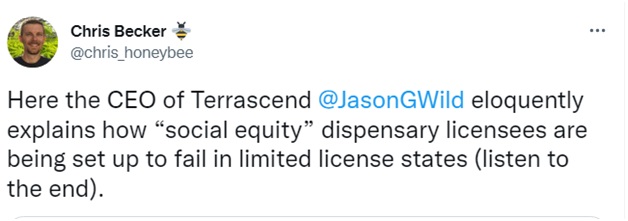Jason Wild, Chairman of TerrAscend, is no stranger to making headlines. Last month on The Dime, he said:
“If you’re a retailer in an under-supplied market, you’re always going to be at a disadvantage because you’re only going to get products from the other players that are vertical.”
On the surface level, nothing controversial. Standard supply and demand in newer, limited license markets will also lead to limitations on organizations that can be cut out of key supplies or ingredients.
Chris Becker (@Chris_honeybee) had a different perspective on the quote, and it really got me thinking. This is the link for the full conversation.

We open social equity licensees and no longer limit them. Placing limits on licenses leads to corruption and bribery (my assumption). I have no proof, but it’s easy to assume that limiting golden tickets allows the game to not be fair for all interested parties. Opening license caps will likely have a ton more businesses enter the industry, which will also have a massive amount of them likely failing. Sadly, this is part of a free market, and not everyone deserves a trophy or generational wealth for participating. Survival of the fittest is exactly that. Supply and demand will hopefully find an equilibrium.
Below you can find the full version of the Jason Wild quote:
Are social equity dispensary licensees being set up to fail in limited license states? Should an industry’s expectations be that all operators play on an even playing field, and whose responsibility is all of this to advocate for fairness? States claim that they want to right the wrongs of the past and help minorities, as well as push for social justice, but how is that possible given the limitations to access to capital and current market conditions?
Is that Jason Wild’s and other Mso’s fault? No, definitely not. While some of the larger titans might help to influence their local politicians for limited license states (a different conversation), they (the MSOs’) should not be held directly accountable for how the game is set up. Politicians and those writing the rules to limit the number of participants in the market are the ones that should be in the crosshair when figuring out what is fair or unfair.
So, what do we do, Bryan? Great question, glad you asked.
The end goal is to have a fair, open supply chain that may be dictated by a few big players, but that doesn’t restrict the supply and demand of product moving into the space. Limits on products and licenses make it extremely hard for smaller, mom-and-pop shops to survive.
“If they have extra product, they’re willing to sell to you. So, during the best times, when the market is early on, there’s the most demand relative to supply. You’re at a major disadvantage if you’re only all retail, and you’re also at a disadvantage if the market gets more mature.”
I encourage you to listen to the entire conversation or read the interview here. This way, you can at least be informed on the complete context of his statement before you go and attack big MSOs.
Editors’ Note: This is an excerpt from our Monthly Playbook. If you would like to read the full monthly playbook and join the thousands of others you can sign up below.


